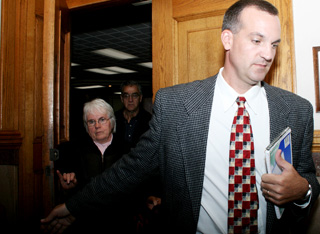Closing arguments center on science
Click here to read the lead story, “Bonnstetter found not guilty.”
Dr. Henry Conroe testified Monday that Mark Bonnstetter was not sleepwalking when he entered a neighbor’s home on Nov. 25, 2006.
Conroe, a forensic psychiatrist, did not claim Bonnstetter had never walked during his sleep on previous occasions but, based on his review of pertinent records, concluded Bonnstetter was not sleepwalking on the night of the alleged incident.
Bonnstetter is the associate director of operations and the head athletic trainer at Eastern.
Conroe, who has a private practice in Chicago, is a psychiatrist and licensed to practice medicine in Illinois.
He has been a forensic psychiatrist since 1994 when he passed his specialization boards.
Conroe said his job as a forensic psychiatrist involves reviewing police reports and medical records before he testifies in court.
He testified he reviewed the transcripts of Bonnstetter’s interview with Charleston police officer Anthony West and the transcripts of the neighbor’s and her boyfriend’s recorded interviews.
Conroe said he reviewed Bonnstetter’s medical records in addition to medical reports from Dr. Donald Greeley, Dr. Rosalind Cartwright and Dr. Jerry Boyd.
He said the first thing he does when producing an opinion in a criminal case is look to see what the defendant is charged with and then piece together what happened based on all available reports.
“The medical records support that (Bonnstetter) has a history of sleepwalking, but what he showed that day was not sleepwalking,” Conroe said about Bonnstetter’s actions on the day of the alleged incident. “Specifically, the defendant was able to give a detailed account of what had occurred.”
Conroe said sleepwalkers do not remember what occurred while they walked in their sleep, and if they do remember what happened, it is a vague memory.
He said Bonnstetter recounted his feelings about the incident to West and gave insight to what was going on in his mind at the time. Conroe said that is something he would not expect from a sleepwalker.
Defense attorney Raipher Pellegrino cross-examined Conroe and asked if he was a specialist in sleep medicine or if he was a member of any medical society of sleep medicine.
Conroe said he was not. Conroe did testify that he has treated some patients with sleep disorders, including sleepwalking, as a psychiatrist.
Assistant State’s Attorney Mick McAvoy said Conroe’s testimony should not be ignored because he wasn’t a sleep specialist.
Conroe testified prior to the jury making a decision on a verdict. On Monday evening, the jury found Bonnstetter not guilty on all three counts.
McAvoy said during his closing argument the prosecution did not disagree that Bonnstetter had issues with sleepwalking. He said that when people witnessed Bonnstetter sleepwalking, he appeared to be “in a daze.”
The Nov. 25, 2006, incident, however, was different from previous times he was found sleepwalking.
“That’s a far cry from what you heard,” McAvoy said.
McAvoy said Bonnstetter knew what he was doing and cited the interview Bonnstetter had with the Charleston Police Department. McAvoy said Bonnstetter did not wake the woman up by knocking on the bedroom door or even saying anything.
Bonnstetter allegedly lightly touched the skin underneath the woman’s pajama pants right above her underwear.
McAyoy said Cartwright, a sleep expert from Chicago, could not explain such sexual conduct from sleepwalking.
“What he did was a sexual touch,” he said.
Timeline: The trial of Mark Bonnstetter
To view in full screen, click here.
During Pellegrino’s closing argument, he said Bonnstetter was not only predisposed to sleepwalking, but he was more likely to do so than the average sleepwalker.
He said both the neighbor and her boyfriend at the time were not credible witnesses.
He said the woman claimed to have five dreams in a span of 90 minutes, which Cartwright said was not possible.
Since dreams increase sexual arousal, the woman could have imagined the touching, Pellegrino said.
He said the boyfriend was not reliable about when he had his last alcoholic drink that night.
The boyfriend testified that he had his last beer at 9 p.m. that night, but the defense claimed he and the neighbor were at a sporting event until that time.
Scott Richey can be reached at 581-7944 or at srrichey@eiu.edu. Matt Hopf can be reached at 581-7942 or at mthopf@eiu.edu.
Closing arguments center on science

Mark Bonnstetter, Eastern associate athletic director for operations, exits a courtroom in the Coles County Courthouse. (Karolina Strack/The Daily Eastern News)





![[Thumbnail] Eastern's Old Main was quiet Thursday morning while educators who had left the office to strike picketed outside.](https://www.dailyeasternnews.com/wp-content/uploads/2025/04/Strike_01_LT_O-800x1200.jpg)










![[Thumbnail Edition] Senior Foward Macy McGlone, getsw the ball and gets the point during the first half of the game aginst Western Illinois University,, Eastern Illinois University Lost to Western Illinois University Thursday March 6 20205, 78-75 EIU lost making it the end of their season](https://www.dailyeasternnews.com/wp-content/uploads/2025/03/WBB_OVC_03_O-1-e1743361637111-1200x614.jpg)























































![[Thumbnail] Eastern's Old Main was quiet Thursday morning while educators who had left the office to strike picketed outside.](https://www.dailyeasternnews.com/wp-content/uploads/2025/04/Strike_01_LT_O-e1745278869963-600x582.jpg)